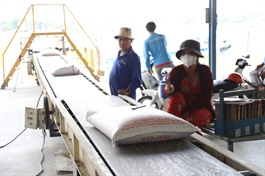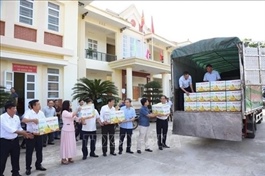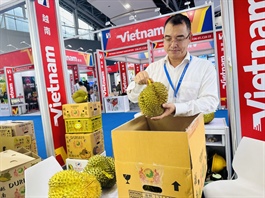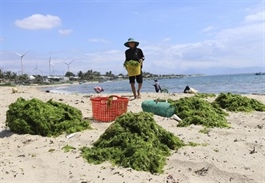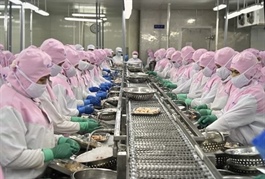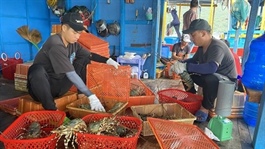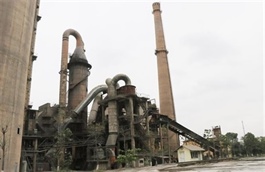Areca nut prices plummet as Chinese traders withdraw from market in central Vietnam
Areca nut prices plummet as Chinese traders withdraw from market in central Vietnam
The price of areca nuts in Quang Ngai Province, central Vietnam, has plummeted by around two-thirds in just 10 days, after being highly sought after by Chinese traders earlier this month.
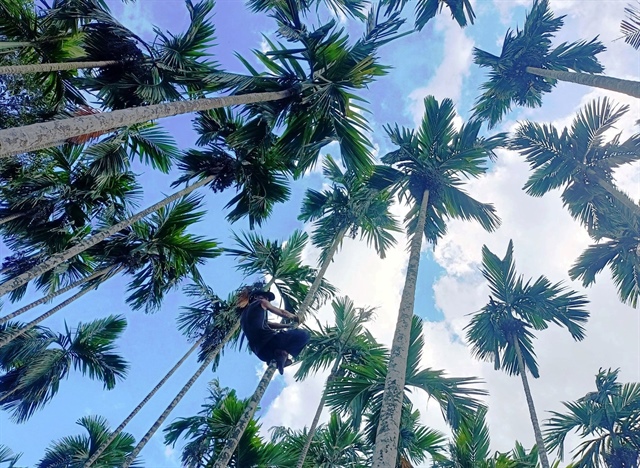
Freshly harvested areca nuts in Quang Ngai Province, central Vietnam. Photo: Tran Mai / Tuoi Tre |
Areca nut prices had plummeted from their peak of VND85,000 (US$3.35) per kilogram to just VND25,000 ($1.00) as of Friday afternoon, leaving many garden owners desperately hoping for buyers.
Hoang, from Nghia Dien Commune in Tu Nghia District, Quang Ngai Province, noted that the dramatic drop in prices has occurred over the past two weeks.
Areca nut gardens that were once bustling with pickers now sit deserted.
“I managed to sell a few bunches, but many in the upper hamlets couldn’t sell anything,” Hoang said.
“Areca nut drying factories are buying almost nothing, so we can hardly sell our produce.”
In Quang Ngai’s Son Tay District, known as the areca nut capital with over 1,000 hectares of plantations, and Nghia Hanh District, with over 700 hectares of areca, sellers are also struggling to find a market.
Purchasing points along the roads have lowered their signs and closed their gates to stop transaction.
This is a stark contrast to the situation earlier this month.
“Just half a month ago, several purchasing points enthusiastically called to see if I had areca nuts to sell,” Huy, from Son Tinh Commune in Son Tay District, recalled.
These Vietnamese buyers purchase areca nuts to resell to Chinese traders for areca nut candy production.
“Now, when I bring my produce out, they say they’ve stopped buying,” Huy added.
Be, from Tinh Ha Commune in Quang Ngai’s Son Tinh District, shared that just six days ago, she sold areca for VND75,000 ($2.96) per kilogram, but on Friday morning she could only sell 400 kilograms for VND25,000 per kilogram.
“It’s only been a few days, but compared to the old price, I lost VND20 million ($788),” Be said.
“Everything changed so quickly.
“Even though I knew the price would drop, I didn’t expect it to happen this fast.
“Still, I’m relieved to have sold some.”
 |
| A picker harvests areca nuts at a garden in Quang Ngai Province, central Vietnam. Photo: Ngoc Khoi / Tuoi Tre |
It was all thanks to luck that Be was able sell her 400 kilograms of areca.
Her picker had been instructed by his drying factory to collect only 500 kilograms that day; any excess would not be purchased.
Despite this limitation, he chose to buy Be’s produce instead of gathering small amounts from various gardens, simply because he sympathized with her situation of living alone.
In general, areca nut sellers in the flat districts of Quang Ngai are struggling, although some farmers remain optimistic that a price of VND25,000 per kilogram is still acceptable.
Higher standards
The usual Chinese traders who purchased areca in Quang Ngai returned to their home country five days ago, according to L., a buyer of areca nuts in Nghia Hanh District.
Additionally, some traders from Hanoi who had traveled to Quang Ngai to negotiate directly with Chinese buyers have also left the province.
Following this, areca nut prices dropped.
“My family’s drying facility still has orders, so we will continue to purchase and dry the nuts,” L. said.
“After this batch, we’ll decide whether to keep collecting or stop, depending on the situation.”
He added that despite the price drop, some VND30,000 ($1.18) per kilogram is still quite good, and areca growers are not significantly affected.
The main issue is that the drying facilities are left with dozens of metric tons of unsold dried areca.
Nga, an owner of an areca nut purchasing point that continues to buy in small quantities, mentioned that the drying factory she sells to still purchases, but with strict requirements.
“If the fruit is even slightly small, they refuse to buy it,” she explained.
“Now when the areca nuts are delivered, I have to carefully review.
“If the bunch is good, I buy it; if it’s bad, I won’t.
“If I buy them regardless of their size, I can’t sell them to anyone.”
H., a buyer of dried areca nuts, also mentioned that Chinese partners are purchasing less and set higher standards.
“We’re uncertain about how to proceed,” H. confided.
“If we buy based on the standards and prices they set earlier, and then a few days later they raise the standards, we could lose a lot of money.
“They also don’t make payments in advance, so I’m hesitant to buy from farmers at the current lower prices.”
Traders experienced in the areca nut market believe that prices are unlikely to recover until the end of the season and may continue to fall.








